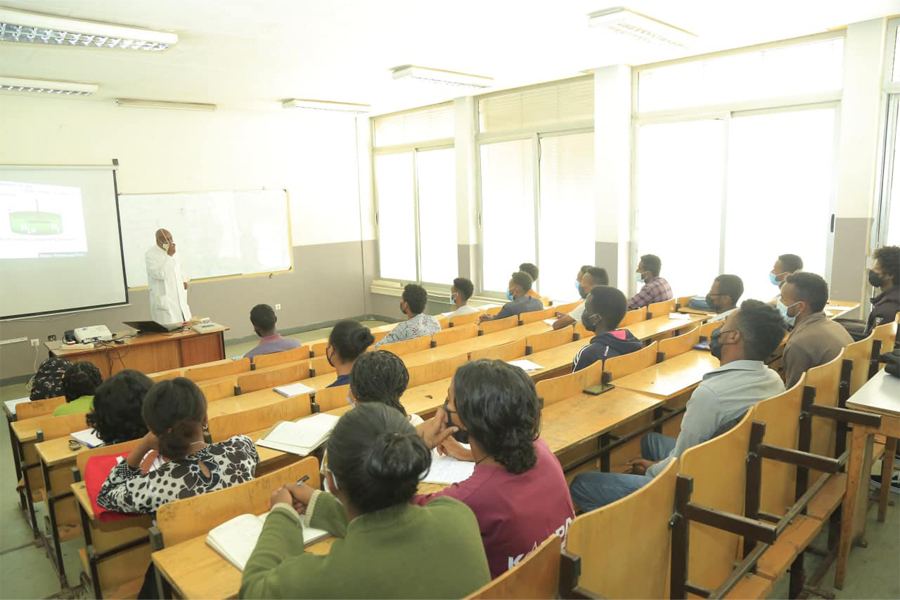
Fortune News | Jul 10,2020
Aug 21 , 2021
By Asegid Getachew
The COVID-19 pandemic has wreaked havoc all over the world for almost two years now. Apart from the loss of life and devastation to the economy, the pandemic has changed the way we go about our daily lives. One area that has remarkably been affected by the raging virus is how work is handled. Before the pandemic, employees and managers converged at the office for eight-plus hours to take care of the day-to-day activity of their organisations. However, during the pandemic, due to social distancing measures to curb the further spread of the virus, most firms started allowing their employees to consider work-from-home arrangements.
Although it is not a new phenomenon, its usage intensified during the pandemic. The application of the concept may not be the same across industries, but trends indicate that most firms are considering it a viable option. For example, the global social media giants Twitter and Facebook recently announced that they might consider allowing their employees to work from home indefinitely.
"The past few months have proven we can make that work," Jack Dorsey, Twitter CEO, said. "If our employees are in a role and situation that enables them to work from home and they want to continue to do so forever, we will make that happen."
Facebook founder and chief, Mark Zuckerberg, has the same view, expecting the shift to remote work to be lasting.
Studies also indicate that work-from-home is here to stay. A report published on Forbes headlined, "This Is the Future of Remote Work In 2021," indicates that "by 2025, an estimated 70pc of the workforce will be working remotely at least five days a month. While 2020 may be considered the year of remote work, it is just the beginning as we see the trend continuing in 2021."
Work-from-home arrangements may have been taken as a measure to curb further transmission of the virus. However, even after major economies have opened up and vaccinations have started being rolled out, it continues as the new normal. Organisations are considering it as an alternative because of one essential advantage it is offering. The additional investment for office space (rented or self-built) is almost zero under this option. Employees who want flexibility also enjoy this option, and they seem to be more satisfied with it.
Working from home, however, has its issues. The first downside of this option is the difficulty of knowing whether or not employees are engaged and committed while handling their regular duties. The office has some formality to it, including the dress codes and the formal communication among coworkers. All of this is totally absent when working from home. Work-from-home arrangements cannot also feasibly be implemented in all parts of the world because they require massive investment in technological infrastructure.
Nonetheless, the most critical downside happens to be its disregard for an organisational social system, which is crucial to productivity. The importance of the social aspect in an organisational system is a fact established by several empirical studies. The Hawthorne Experiment was one of the studies in this category.
The Hawthorne Experiment (Hawthrone refers to the company's name in which the experiment was conducted) started in the early 1920s. The purpose of the study was to investigate the factors that determine organisational productivity. The study was conducted in multiple stages and considered different factors, such as the intensity of lighting, the length of work hours, and the duration of breaks. Through repeated experiments, the study concluded that social factors (the informal groups in the workplace, the intensity of supervision, communication among workers) explain quite a vast proportion of the variation in productivity of organisations.
Organisations are not purely economic agents where workers are treated as pieces of machinery. Instead, they are "socio-technical systems" that recognise the emotion and interaction needs of employees. Working from home, however, may threaten this crucial system that organisations dearly require to remain competitive.
PUBLISHED ON
Aug 21,2021 [ VOL
22 , NO
1112]


Fortune News | Jul 10,2020

View From Arada | Feb 01,2020

Sunday with Eden | Nov 19,2022

Agenda | Aug 25,2024

View From Arada | Feb 22,2020

Radar | Apr 27,2025

Agenda | Mar 19,2022

My Opinion | Dec 04,2022

Radar | Mar 19,2022

Viewpoints | Jan 01,2022

Photo Gallery | 170378 Views | May 06,2019

Photo Gallery | 160615 Views | Apr 26,2019

Photo Gallery | 150250 Views | Oct 06,2021

My Opinion | 136246 Views | Aug 14,2021





Dec 22 , 2024 . By TIZITA SHEWAFERAW
Charged with transforming colossal state-owned enterprises into modern and competitiv...

Aug 18 , 2024 . By AKSAH ITALO
Although predictable Yonas Zerihun's job in the ride-hailing service is not immune to...

Jul 28 , 2024 . By TIZITA SHEWAFERAW
Unhabitual, perhaps too many, Samuel Gebreyohannes, 38, used to occasionally enjoy a couple of beers at breakfast. However, he recently swit...

Jul 13 , 2024 . By AKSAH ITALO
Investors who rely on tractors, trucks, and field vehicles for commuting, transporting commodities, and f...

Oct 4 , 2025
Eyob Tekalegn (PhD) had been in the Governor's chair for only weeks when, on Septembe...

Sep 27 , 2025
Four years into an experiment with “shock therapy” in education, the national moo...

Sep 20 , 2025
Getachew Reda's return to the national stage was always going to stir attention. Once...

Sep 13 , 2025
At its launch in Nairobi two years ago, the Africa Climate Summit was billed as the f...

Oct 5 , 2025 . By NAHOM AYELE
In Meqelle, a name long associated with industrial grit and regional pride is undergo...

Oct 5 , 2025 . By BEZAWIT HULUAGER
The federal government is set to roll out a new "motor vehicle circulation tax" in th...

Oct 5 , 2025 . By NAHOM AYELE
The Bank of Abyssinia is wrestling with the loss of a prime plot of land once leased...

Oct 5 , 2025 . By BEZAWIT HULUAGER
The Customs Commission has introduced new tariffs on a wide range of imported goods i...